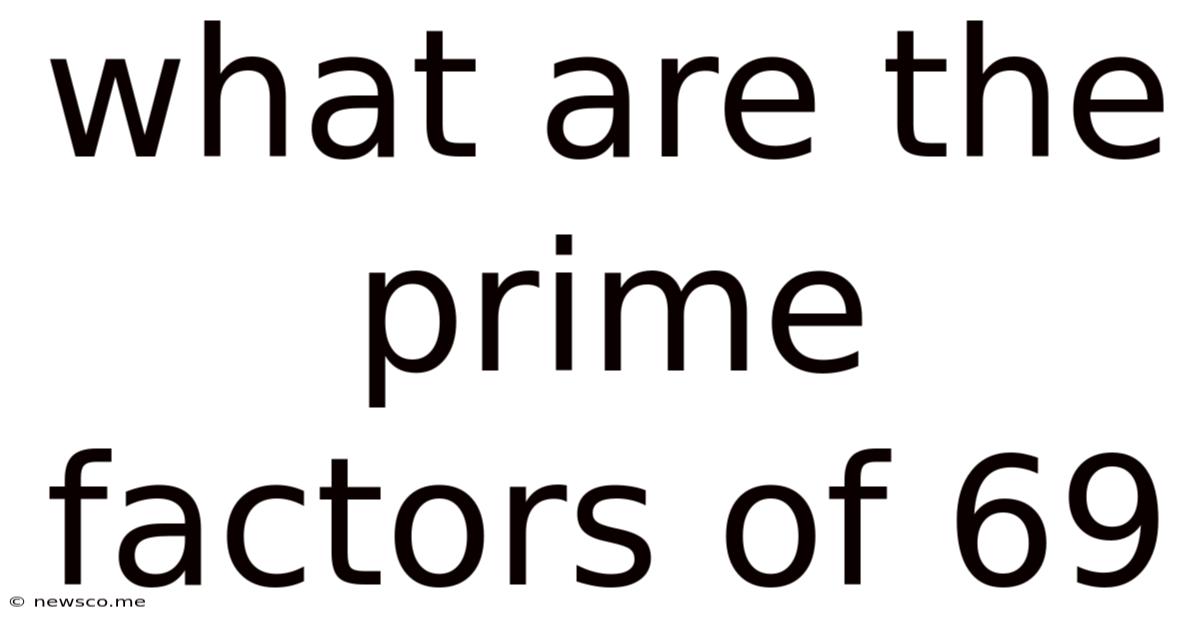What Are The Prime Factors Of 69
News Co
Apr 16, 2025 · 4 min read

Table of Contents
What are the Prime Factors of 69? A Deep Dive into Prime Factorization
The seemingly simple question, "What are the prime factors of 69?" opens a door to a fascinating exploration of number theory, a fundamental branch of mathematics. While the answer itself is straightforward, the journey to understanding how to find prime factors and the significance of prime numbers provides valuable insights into the building blocks of numbers. This article delves into the process of prime factorization, exploring the concept of prime numbers, methods for finding prime factors, and the broader applications of this mathematical principle.
Understanding Prime Numbers
Before we tackle the prime factorization of 69, let's establish a solid understanding of prime numbers. A prime number is a natural number greater than 1 that has no positive divisors other than 1 and itself. In simpler terms, it's a number that can only be divided evenly by 1 and itself. The first few prime numbers are 2, 3, 5, 7, 11, 13, and so on. The number 1 is not considered a prime number.
Prime numbers are the fundamental building blocks of all other whole numbers. This is because every whole number greater than 1 can be expressed as a unique product of prime numbers. This is known as the Fundamental Theorem of Arithmetic. This theorem forms the basis of prime factorization.
Methods for Finding Prime Factors
Several methods can be used to find the prime factors of a number. Let's explore some of the most common techniques:
1. Trial Division
This is the most straightforward method, particularly suitable for smaller numbers. We systematically try dividing the number by each prime number, starting with the smallest prime number, 2. If the division results in a whole number, we've found a prime factor. We repeat this process with the quotient until we are left with 1.
Let's illustrate this with a simple example: finding the prime factors of 12.
- Divide 12 by 2: 12 ÷ 2 = 6
- Divide 6 by 2: 6 ÷ 2 = 3
- 3 is a prime number.
Therefore, the prime factorization of 12 is 2 x 2 x 3, or 2² x 3.
2. Factor Tree
The factor tree method provides a visual representation of the prime factorization process. We start by breaking down the number into any two factors. We then continue breaking down each factor until all factors are prime numbers.
Let's use the factor tree method to find the prime factors of 24:
24
/ \
2 12
/ \
2 6
/ \
2 3
The prime factorization of 24 is 2 x 2 x 2 x 3, or 2³ x 3.
3. Division by Prime Numbers
This method is similar to trial division but focuses exclusively on dividing by prime numbers. This ensures efficiency by avoiding unnecessary divisions by composite numbers. We start by dividing the number by the smallest prime number (2), then by the next smallest (3), and so on. We continue this process until the remaining number is 1 or a prime number itself.
Finding the Prime Factors of 69
Now, let's apply these methods to find the prime factors of 69. We can start with trial division:
- Is 69 divisible by 2? No, because 69 is an odd number.
- Is 69 divisible by 3? Yes, 69 ÷ 3 = 23.
- 23 is a prime number.
Therefore, the prime factorization of 69 is 3 x 23. Both 3 and 23 are prime numbers, confirming the Fundamental Theorem of Arithmetic. Using a factor tree would yield the same result:
69
/ \
3 23
The Significance of Prime Factorization
Prime factorization might seem like a purely mathematical exercise, but it has significant applications in various fields:
1. Cryptography
Prime numbers play a crucial role in modern cryptography, particularly in public-key cryptography systems like RSA. The security of these systems relies on the difficulty of factoring large numbers into their prime components. The larger the prime numbers used, the more secure the encryption.
2. Number Theory
Prime factorization is fundamental to numerous concepts in number theory, including modular arithmetic, the study of congruences, and Fermat's Little Theorem. These concepts have far-reaching implications in various mathematical and computational fields.
3. Computer Science
Algorithms for prime factorization are continuously being developed and refined. Efficient prime factorization algorithms are crucial for various computer science applications, including cryptography and data security.
4. Coding Theory
Prime numbers play a role in coding theory, particularly in the design of error-correcting codes. These codes are essential for reliable data transmission and storage in various communication systems.
Conclusion: Beyond the Simple Answer
While the prime factors of 69 are simply 3 and 23, this seemingly straightforward problem opens a window into a rich and complex world of number theory. Understanding prime factorization is not only important for solving mathematical problems but also for appreciating its wider implications in cryptography, computer science, and various other fields. The process of finding prime factors, whether through trial division, factor trees, or other advanced algorithms, provides valuable insights into the fundamental structure of numbers and their interconnectedness within the mathematical universe. The seemingly simple question of factoring 69 highlights the depth and complexity hidden within the seemingly mundane aspects of mathematics. It demonstrates the power and elegance of prime numbers and their crucial role in shaping our understanding of the numerical world.
Latest Posts
Related Post
Thank you for visiting our website which covers about What Are The Prime Factors Of 69 . We hope the information provided has been useful to you. Feel free to contact us if you have any questions or need further assistance. See you next time and don't miss to bookmark.